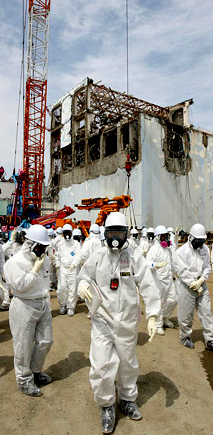Ex-TEPCO heads face court
 Three former TEPCO executives are facing trial over their roles in the Fukushima disaster.
Three former TEPCO executives are facing trial over their roles in the Fukushima disaster.
The former Tokyo Electric Power Company (TEPCO) leaders have been charged with professional negligence leading to injury or death.
While no deaths were directly attributed to the triple reactor-core meltdown, 44 patients died after their evacuation from a hospital in the evacuation zone.
There were also a number of injuries among TEPCO employees and members of Japan's military in the aftermath.
TEPCO Chairman Tsunehisa Katsumata and his two co-accused, Sakae Muto and Ichiro Takekuro, were in charge of TEPCO's nuclear division at the time of the disaster.
None of the three were in Fukushima on the day of the accident, but it will be argued that in the years before the nuclear disaster, the executives were aware of internal reports and simulations warning of the risks of a major earthquake/tsunami events.
The plant was known to be able to withstand a wave of 5.7 metres in height, but the tsunami that struck in 2011 was 15 metres high.
“I hope the truth of the nuclear accident comes out as it's still not clear why it happened and who was responsible,” said Ruiko Muto, head of the Fukushima Nuclear Disaster Plaintiffs group.
“The people who were in charge should take proper responsibility.”
Ms Muto's group has been campaigning for charges to be laid ever since prosecutors earlier decided against charges due to a lack of evidence.
They were successful after a citizen's panel — an element of Japanese law that has power to review judicial decisions — overturned the decision and called for charges to be laid against the men early last year.
“They neglected the safety measures which they could have taken. As a result, hundreds of thousands of people's lives were turned upside down and caused huge damage,” Ms Muto said.
The trial will run for many months and is expected to include up to 4000 pieces of evidence.
“The charge here is that they [TEPCO] basically didn't comply with their own corporate recommendations about the protective measures along the coast and that made the plant vulnerable to the tsunami,” Kyle Cleveland, an associate professor of sociology at Japan's Temple University, told reporters.
“The point here is that with a disaster of this magnitude, you're dealing with an interlocking matrix of corporate entities, all of whom are partially responsible for this.
“To be able to focus blame on a particular individual is something that is rather difficult to do.”
Meanwhile, TEPCO is washing its hands, saying the case is about three “individuals, not the company”.







 Print
Print